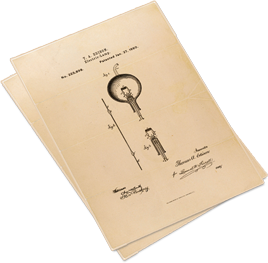What does the copyright protect?
A work of original authorship that qualifies for copyright protection is property. The right to make and distribute copies of it can be bought, sold, traded, leased, loaned, leveraged, forfeited, lost, damaged, misappropriated and stolen. Moreover, the right to make and distribute copies, because they are copies, can be divided, and specific rights to make copies in specific ways can be sold, loaned, or leased (“licensed”) separately, forever or for a period of time. If someone copies the work and distributes, displays, or performs it without permission, the owner of the copyright in the work has recourse in the courts to seek compensation and restitution for the damage done by the copier.
So who “owns” the copyright?
First, the author.
At the time the work is created and “fixed in [a] tangible medium,” the exclusive right to make and distribute copies of the work vests in its author.
Or the author’s employer.
The exception to the automatic ownership of a work by its author is when a work is created for a company, business enterprise, firm, or organization, including a government, by an employee of that establishment in the course of his or her employment. In that case, the “author” of the work is the employer. Often employer-owned works include things that are job-related even when created outside the place or hours of employment. An employer cannot, however, usually claim ownership of a work that is not related to an individual’s job or the business of the employer that is not created using the employer’s time and/or resources. So the employer of a person whose job it is to write advertising copy does not have any claim of ownership of the Great American Novel that person writes at home in the wee hours, unless, perhaps, that employer is a publisher of Great American Novels and there is an employment agreement giving the employer ownership of such things.
Or a person or company to whom a right to copy is expressly given.
The transfer of the copyright in a work must be made in writing, and with few exceptions, even the grant of any particular right to copy, display, or perform a work should be in writing.
So when I pay someone to make a family portrait to hang in the lobby of our family business, I own the copyright. Right?
No. You don’t.
An employee is someone who works on a regular schedule agreeable to you and to whom you pay a regular salary or wage and deduct taxes and provide all the other things the employment laws of your state require. When you hire a person or firm outside of your employ to design your logo, write a user manual for the widgets you sell, build your Web page, or photograph your wedding, that person or firm is an “independent contractor” The copyright remains with the independent contractor unless the contractor expressly transfers the copyright to you in writing. Without an explicit transfer or license of rights:
- You have an implicit license to use the logo as logos are used — on letterhead and business cards, on the front door of your business, in advertising — but you don’t have the right to tell your mother-in-law it’s okay to use it as a design woven into the socks she knits and sells at the community flea market.
- You have an implicit license to distribute the user manual with your widgets, but you don’t have the right to replace sections 3 and 12 and distribute the revised edition with another widget.
- You have an implicit license to put the Web page on line, but you don’t have the right print and distribute it as a handbill.
- You can buy from the photographer the wedding album for yourself, and buy keepsake albums for the parents, and buy prints of some of the photos to give to friends and family, but you don’t have the right to take photos from the album you bought and scan them and print them and hand them out as if they were yours. They aren’t yours to copy.


